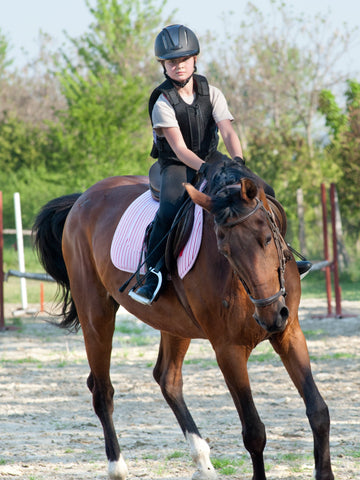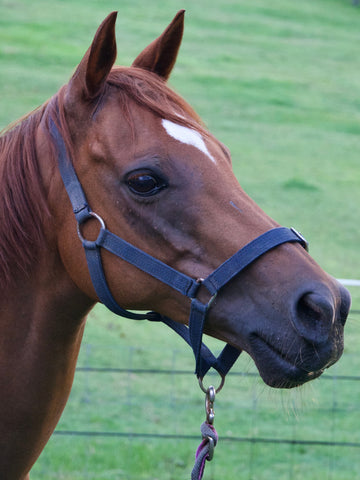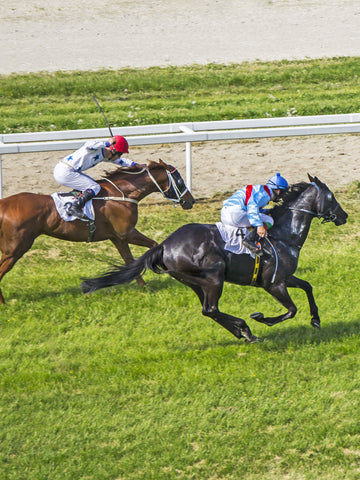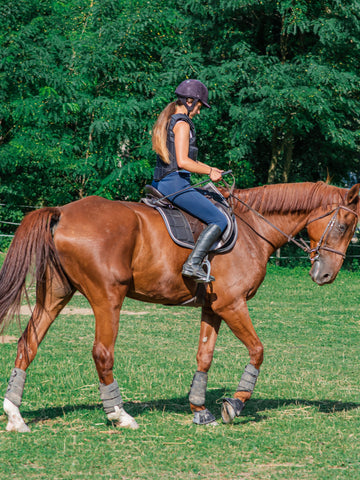Colic claims the lives of hundreds of horses every year, which makes it a major concern for horse owners. It’s one of the most difficult conditions to treat perhaps because colic in itself is not a disease but a symptom of another problem.
Depending on the cause, a horse with colic will often kick or bite their belly or flank, keep looking at their side, or pass fecal balls that are smaller than usual. In severe cases, they may even roll themselves on the ground out of pain.
So, what is horse colic exactly, and what causes it? Keep reading!
Horse Colic Explained
Colic simply means abdominal pain. It often arises when there is a problem in the horse’s digestive tract.
While the condition can result from gas buildup in the large intestines or torsions in the digestive system, most colic episodes are of unknown origin, and the severity of each case can vary greatly.
For instance, an equine may have mild pain that is treated with just a single dose of medication. In other cases, the disorder may be life-threatening and may require surgery or even euthanasia.
No matter the severity of your case, all colic incidences are a potential danger to the horse’s life and should be treated as an emergency. If your equine is displaying any colic symptoms, consult a veterinarian right away.
Also, it is important that you regularly examine your horse when they are healthy; it will help you know when something is not right.
Causes of Horse Colic
There are a host of things that can cause colic in horses. The most common include:
1. Fecal Impaction
Horses suffer from fecal impaction when they eat dry hay and fail to drink enough water. But if a horse has chronic dehydration, fecal impaction can occur after eating anything.
Usually, a large, hard mass of manure gets completely stuck in the large intestines that the animal is unable to push it out. The problem can be quite severe and can cause serious health problems or even death if not treated soon enough.
Feeding your horse dry feed and not giving it water can be disastrous. Without water, the feed will have trouble moving smoothly through the digestive tract and will get stuck in the intestine. This will often cause discomfort in the horse, which will likely result in them displaying colic symptoms.
2. Parasites

A horse with a parasite load or damage may colic too. When parasites invade the animal’s intestinal tract, they damage it, leaving it inflamed and irritated.
Equines with a parasite load or those who have recently been dewormed to remove parasite loads may exhibit signs of colic.
If parasites are not addressed early enough, they may cause health problems that may be difficult to treat. To prevent colic and keep your equine healthy, make sure you are deworming the animal regularly; it will help keep the parasites in control.
3. Frigid Water
Drinking huge amounts of cold water can cause a horse to appear colicky. This is especially true if the animal has Equine Gastric Ulcer Syndrome (EGUS).
During cold weather avoid giving your horse cold water. You can keep the water warm with a trough heater, heated bucket, or by simply bringing hot water in a bucket to mix with the frigid water in the trough.
Frosty water will send a cold shock to the horse’s stomach, and if the animal drinks too much of it, you will see it colicking. Cold water can also cause fecal impaction.
4. Twisted or Telescoped Intestines
Nobody really knows why horse intestines twist, loop, or telescope, but some people believe it happens when the animal rolls.
While it can happen in every horse, it is more prevalent in big barred equines and those who have birthed several foals. It is believed that the accumulation of fats on the intestines is what makes them to twist or flip.
When a section of your horse's intestines is twisted, digestion will not take place efficiently and the animal will end up having lumps of feces stuck in the intestines. This may result in severe stomach discomfort, and you may see the horse rolling on the ground, neighing in pain.
Get them checked right away by a vet. While most twists can be treated with a single surgery, depending on the nature of the problem, some horses may have to undergo several surgeries before the problem is fixed.
Symptoms of Horse Colic
Different horses will exhibit different colic symptoms based on the cause of the underlying problem, but the most common signs and symptoms of colic will include:
- Extreme restlessness
- Curling of the upper lip
- Pawing the ground
- Kicking or biting of the belly or flank
- Rolling on the ground
- Passage of dry, mucus-covered feces or total lack of defecation
- Lack of appetite
- Poor water intake
- Abnormally fast heartbeat
- Excessive sweating
- Abnormal or absence of gut noises
- Regularly stretching out as if to pass urine
- Body injuries due to rolling and thrashing around
- Swishing of the tail
- Lying on the back
- Extreme dullness
- Bloodshot lips or eyes (or both)
To further understand horse colic signs and symptoms, watch this video.
When monitoring a horse showing these symptoms, proper footwear is crucial for your safety. Wild Jolie Cowgirl Boots provide the protection needed when working around horses in pain that may kick or move unpredictably. Their sturdy construction shields your feet while allowing the mobility needed to quickly respond to a colicky horse's changing condition.

How to Diagnose Horse Colic
It is important that you familiarize yourself with the above symptoms of horse colic so you can easily identify the condition. Not just that; you should be able to take the readings of vital signs like your horse’s temperature, heart and respiratory rate, and the color of the mucous membrane.
If you have a stethoscope, try listening to your horse’s gut sounds too. Share this information with your vet so they can have an idea of your animal’s condition.
To identify the cause and severity of your horse colic, the vet will check the equine’s heart rate, temperature, mucous membrane color, gut sounds, and respiratory rate again and ask you questions regarding the animal’s recent behavior, activity level, diet, etc.
Depending on the severity of the condition, the vet may administer pain medications as treatment or continue with the diagnostics.
To further examine the horse, the vet will first give sedation to make the animal comfortable. They may start with a rectal exam where they palpate sections of the gastrointestinal tract to see if they are dilated or dislocated.
The vet may also assess the feces in the rectum to know if the horse has impaction colic. In some cases, they will also insert a nasogastric tube through the animal’s nostril into the stomach to check for gas or fluid buildup in the stomach.
How To Treat Horse Colic

The method used to treat your horse will depend on the type of abdominal pain (colic) they have. When the pain is severe, the vet will administer analgesics to help bring it down.
In the case of gas and fluid accumulation in the stomach, they will use a nasogastric tube to remove this buildup. They may also use IV fluids if the animal is dehydrated.
If the horse has a fecal impaction, the vet will try to get the feces moving smoothly again by giving the animal a laxative or lubricant. Something like mineral oil, for instance, will help loosen and remove the impaction.
Serious cases of colic such as when a section of the horse’s intestines is twisted, looped, or telescoped, may require surgery. However, how successful the surgery will be will depend on the health condition of the horse, where within the digestive system the problem is located, and how long the problem has existed.
But surgical colic cases are usually minimal; the majority of colic episodes can easily be resolved with medication. Make sure to follow the medications, activity levels, and feeding plans recommended by your vet.
Once the horse has recovered, don’t be in a rush to return them to work. Let them get back at their own pace and pay attention to any recurring symptoms of colic.
How to Prevent Horse Colic
Most of the time, horses will experience abdominal pains for no apparent reason. But it’s important that you know some of the things you can do to minimize colic episodes. Here are a few:
- Make sure your horse consumes enough roughage by feeding them hay or pasture. It’s good for the gut.
- Give your horse fresh, clean water, and during cold weather, keep checking the water in the troughs to make sure it’s not frozen. This can help prevent fecal impaction.
- Have your horse’s teeth checked regularly to make sure none is missing or preventing the animal from grinding their food properly.
- Deworm your horse frequently to keep intestinal parasites under control.
The Takeaway
Horse colic can be a nightmare not only to the animal but also to their owner. While most cases aren’t severe and can be treated with simple medication, some can be life-threatening and may require surgery.
But you can minimize colic episodes by feeding your horse the right diet, making sure they are not dehydrated, and deworming them regularly. And in the unfortunate event that colic does occur, have your horse checked immediately by a qualified veterinarian.





















